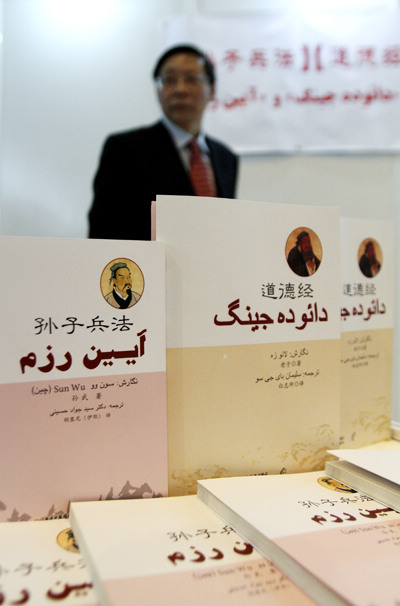|
 |
|
COMMON TREASURE: A book launch of the Farsi-version The Art of War and Tao Te Ching, two Chinese classic works, is held in Tehran of Iran on May 4, 2011. In the picture are the two books (XINHUA) |
Riding the wave of success from the 3D release of Titanic in China, Hollywood director James Cameron recently signed on to the crew of The Art of War, China's first 3D film. The film will be the first 3D film jointly produced by Chinese and U.S. directors.
The Art of War tells the tale of Sun Tzu, an ancient Chinese strategist, philosopher and author of the Chinese classic of the same name about military strategies and tactics.
"Cameron can help us tell the story better. The film will lead the world to expect more enlightenment from Chinese stories such as that of Sun Tzu. The film is not only a story about history, but also a story about today and tomorrow," said Hu Bo, Chinese director of the film.
The film is the outcome of the rising popularity of The Art of War across the globe. Hopes are that it will lead to a new wave of enthusiasm toward Chinese classics.
The Art of War is an ancient Chinese military treatise that is attributed to Sun Tzu, a high-ranking military general during the late Spring and Autumn period (770B.C.-476B.C.).
Composed of 13 chapters, each is devoted to one aspect of warfare. As one of the world's oldest and most successful books on military strategy, for the last 2,000 years it has produced significant influence on Eastern military thinking, business tactics and beyond.
The book was first translated into French in 1772 by French Jesuit Jean Joseph Marie Amiot and then English by British officer Everard Ferguson Calthrop in 1905. Leaders as diverse as former Chinese leader Mao Zedong, Vietnamese General Vo Nguyen Giap and American General Douglas MacArthur have drawn inspiration from the work. The Art of War has also been applied to business and managerial strategies.
The majority of Chinese modern and contemporary works, however, have something of a limited audience. But two books—The Art of War by Sun Tzu and Tao Te Ching by Lao Tzu—are global bestsellers, said Zhu Li'an, a journalist with China Radio International at the London Book Fair on April 16.
In Asia, the book's influence is even more profound. In New Delhi, India, The Art of War flies from bookshelves before it can be restocked.
"In recent years, Chinese classic works have been very popular. Of them, The Art of War takes the lead. Our bookstore has bought many editions of The Art of War, and they are all sold out soon. We are planning to buy more, because there are still many people waiting to buy it," said Gurrinder Singh Khanna, a bookstore employee in New Delhi.
The same is true in South Korea, Iran and other Asian countries.
| 